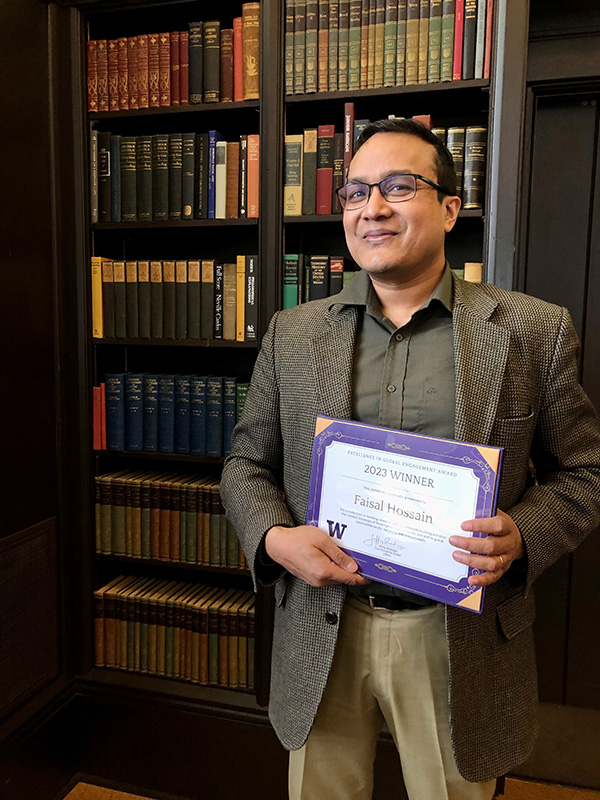May 11, 2023
From helping to conserve water to reducing food insecurity in numerous countries around the world, a steady stream of accomplishments have led to Professor Faisal Hossain being named the inaugural recipient of the 2023 UW Excellence in Global Engagement Award.

Professor Faisal Hossain
“This recognition would not have been possible without the students and colleagues across campus and around the world who collaborated unselfishly for the greater good. UW is truly the Global University of the 21st century,” Hossain says.
Newly introduced this year, the award honors one faculty or staff member annually for their leadership in global engagement. Since joining the UW in 2014, Hossain has worked to help numerous countries throughout the world effectively manage their water resources and improve crop production through the application of computer models and satellite remote sensing data.
In 2016, Hossain’s research group began partnering with the Pakistan government to overcome costly groundwater management challenges in the Indus Basin, home to 100 million people. The remote sensing-based system co-developed by Hossain’s research group enabled Pakistan’s government to produce monthly projections of its groundwater stocks and make district-level water management decisions.
Another project, which started with 700 farmers in the Indus Valley using a satellite-based text messaging system to conserve water and improve crop yield, was expanded to 10,000 farmers in 2017 and to 100,000 farmers in 2018. The success of the system in Pakistan led to a smart technology farmer irrigation solution called PANI that was deployed in India in 2018 and Hossain’s team continues to develop the system for use in Bangladesh. The Government Agricultural agency of Bangladesh has recently adopted and maintained the irrigation advisory system co-developed by Hossain’s team. In more recent years, Hossain has also co-developed solutions for reservoir management in Cambodia, Laos, Vietnam, Egypt and Iraq. At a more local level, he has recently engaged with tribal authorities to develop reservoir tools to improve fishery resource management for the regulated Columbia River.
Professor Hossain has spent much of his career supporting developing nations by creating real-world water management and forecasting systems and by building the institutional capacity to use these systems successfully”
“Professor Hossain has spent much of his career supporting developing nations by creating real-world water management and forecasting systems and by building the institutional capacity to use these systems successfully,” states the nomination letter.
The success of Hossain’s real-world research implementation can be traced back to a unique model he developed for working with stakeholders in other countries, which takes into account the cultural and socio-economic context. Hossain calls the training protocol the “backward-forward hybrid model for capacity building and training.” During the initial forward phase, UW researchers and graduate students disseminate research findings to foreign agencies and university stakeholders through relationship building. In the later backward phase, staff and students at stakeholder organizations are brought to the UW for immersive co-learning with the research group and to co-develop tools that can meet the needs of foreign stakeholder environments.
“So far, Professor Hossain has trained more than 10 UW graduate students and about 300 trainees from more than 10 different organizations and developing nations (Bangladesh, India, Pakistan, Nepal, Thailand, Vietnam, Ethiopia, Jordan and Egypt). This training and education activity has resulted in numerous real-world societal applications led and co-developed by UW students in Hossain’s research group,” according to the nomination letter.